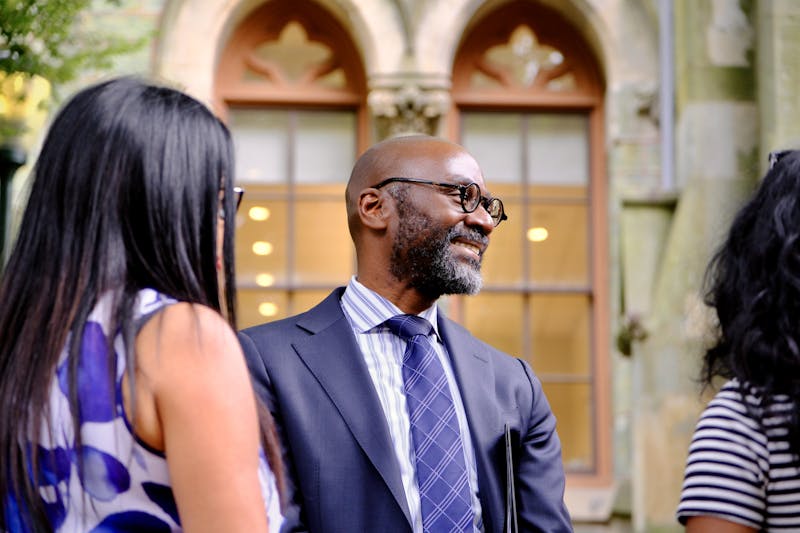From Ronald Kim's, "The Wretched of the Earth," Fall '00 From Ronald Kim's, "The Wretched of the Earth," Fall '00After the carnage and mass murder of World War II, Europeans found themselves questioning the moral depths to which their generation had sunk. Quickly deteriorating relations between the United States and the Soviet Union boded ill for international peace; the dawning Cold War divided Europe, then the world, into two hostile camps. Possibly no one has predicted a bleaker future than George Orwell, the high priest of negative utopia. In 1984, Orwell describes a dehumanized world in which all citizens have been subject to the State and its invisible Big Brother. The Party maintains power solely for the sake of power, regulating all activity from writing to sex. An endless war divides the world into three hostile blocks, Oceania, Eurasia and Eastasia (read America, Russia and China). Last week, while staying at a hostel, I met a man who had just bought 1984 and was reading the appendix on "The Principles of Newspeak." Consider some of Orwell's premonitions: · The complete perversion and purging of political language, so that anyone accused of nonconformism is immediately branded a "communist" (in McCarthy's U.S.) or a "counterrevolutionary" (in Stalin's Soviet Union). Such labeling should be familiar to anyone with "dangerous" political views today. · The equation of words with their opposites. War Is Peace. Freedom Is Slavery. German Democratic Republic. Bombing for peace. Free trade, just like the slave trade. And justice for all. · "Prolefeed," a constant diet of trash entertainment meant as "feed" for keeping the proletariat perpetually mindless. Think Hollywood, Jerry Springer and JonBenet Ramsey. I recently looked at 1984 after many years and was shocked at how much of it has not only come to pass, but has been taken for granted. Telescreens in every room may not yet exist, but TV and computer screens certainly do, bringing us a steadily increasing stream of "prolefeed" and propaganda. Two years ago, my alma mater Princeton decided to lock all dormitory doors around the clock. Students were given special computerized cards to unlock doors and debate ensued over the constitutional right of a university to keep records tracking students' every movement. The notion was disturbing enough. Much more unnerving was that I had gone through four years of having my movements followed and hadn't even thought about it once. I had given my consent to an authority that exercised its power for no apparent cause other than "security." I, too, loved Big Brother. Yet it would be wrong to conclude that the world of 1984 is our necessary fate. Orwell intended his book as a warning, not a prophecy. It's only because his powers of perception were so astounding -- and because we've become so accustomed to life under Big Brother -- that it's difficult to imagine an alternative. That alternative was the subject of some late writings of the German communist Bertold Brecht. As part of the generation that experienced and became radicalized from the horrors of the First World War, Brecht rejected what he saw as the inherent murderousness and injustice of capitalism. One need only read The Three-Penny Opera, his most famous play, to see that Brecht, too, was capable of bleak portrayals of the world in which he lived. But after World War II, with Europe mired in existentialism and moral bankruptcy, Brecht maintained a stubborn optimism in the future of mankind. A believer in social utopia, he would almost certainly have been disappointed at how the "people's republics" of Eastern Europe turned out to be little better than dysfunctional caricatures of military dictatorships. Recently, I came across one of Brecht's poems, addressed to the military leaders who had driven Germany to war and genocide and who seemed to be hurtling all of us toward the abyss. Yes, he admitted, people can be trained to turn against and kill each other in the name of some unknown or poorly understood cause -- religion, nation, homeland, socialism, capitalism, Big Brother -- or for the benefit of some faceless master. But they have one "defect" -- they can think. Today's official triumphalism masks persistent, nagging fears that the world has become truly Orwellian. But instead of fear, Brecht -- and like-minded intellectuals then and now -- refused to surrender genuine faith in humanity. As long as even one person can think and can get others thinking, there's hope that we can escape the fate that Orwell so brilliantly predicted for us, and that idealists like Brecht knew just might not be inevitable after all.
The Daily Pennsylvanian is an independent, student-run newspaper. Please consider making a donation to support the coverage that shapes the University. Your generosity ensures a future of strong journalism at Penn.
DonatePlease note All comments are eligible for publication in The Daily Pennsylvanian.







